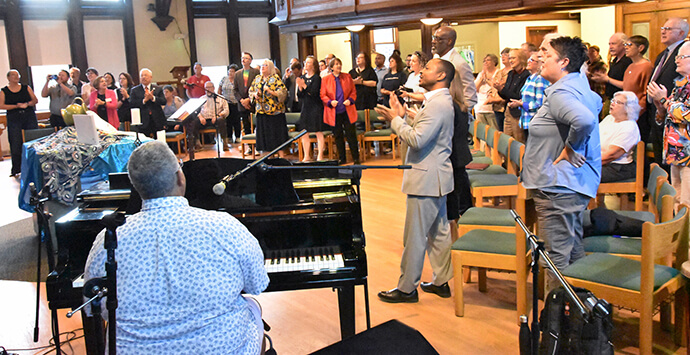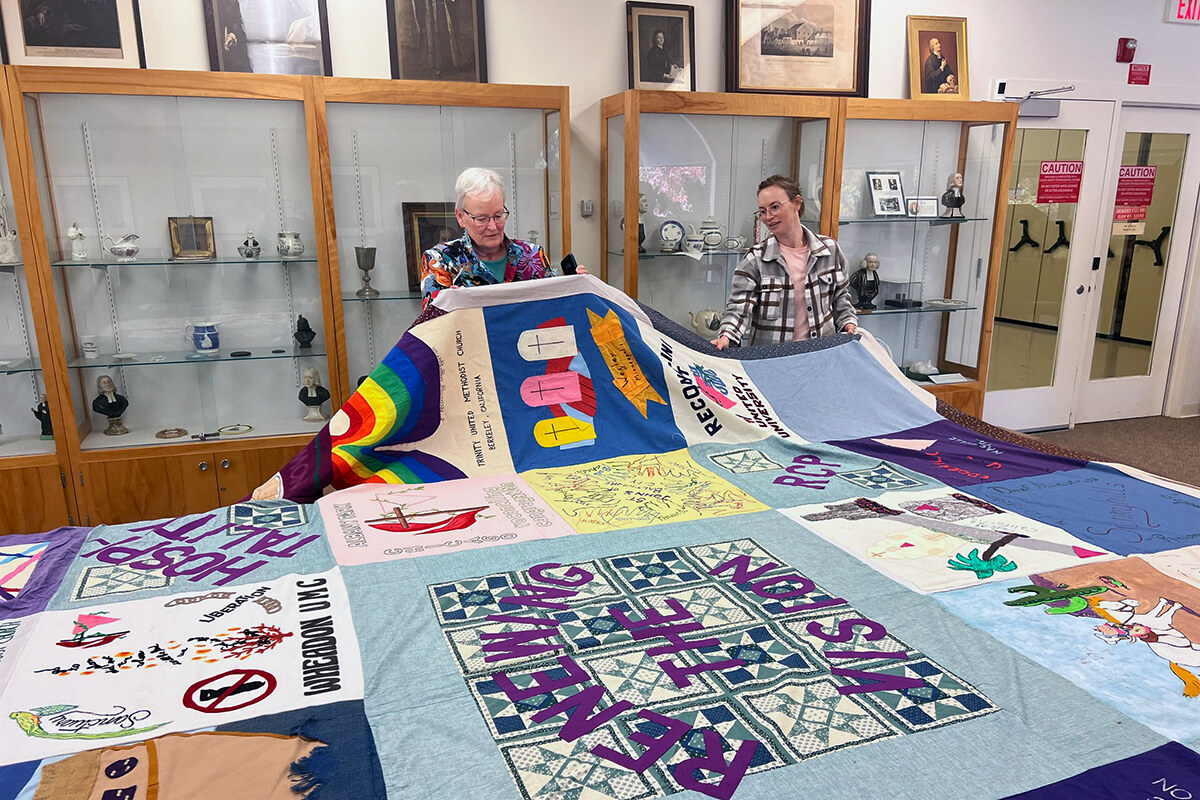Key Points:
- Ashley Boggan D., top executive of the United Methodist Commission on Archives and History, described the center’s inauguration as “a call to us today and in the future to build a church where all people are seen, heard and valued.”
- Noting that untold stories of LGBTQ members have left gaps in the church’s history and identity, retired Bishop Karen Oliveto emphasized “the importance of storytelling in shaping identity and justice” and called for the inclusion of more diverse stories to enrich the church’s history.
- Keynote speaker Randall Miller offered what he called “an impressionistic portrait” of the church’s LGBTQ inclusion movement’s evolution.
Raising both poignant memories of the past and needed funds for the future, the Oct. 23 inauguration of the new LGBTQ+ United Methodist Heritage Center marked a step forward for inclusivity in the church.
In her welcome, Ashley Boggan D., top executive of the sponsoring United Methodist Commission on Archives and History, described the historic event as “a call to us today and in the future to build a church where all people are seen, heard and valued. It is a call to live into the fullness of our United Methodist identity.”
The evening gathering of about 85 supporters enlivened the chapel of United Methodist-related Drew Theological School, a short campus stroll from the commission’s offices and the United Methodist Archives, where collected, archived and exhibited resources that make up the heritage center will be housed.
Participants celebrated in festive song and earnest speeches by leaders of the church and its LGBTQ rights movement. The event included an exhibit of a historic quilt, and a screening and discussion of the 2022 film “1946: The Mistranslation That Shifted Culture.” The documentary recounts a dramatic history of mistranslations that introduced the term “homosexual” into the Bible, and researchers’ painstaking efforts to correct the error.
Meanwhile, the event attracted over a hundred livestream participants and raised $7,005 to surpass its $5,000 online fundraising goal.
Boggan introduced the new center’s chair, retired Bishop Karen Oliveto, the denomination’s first openly gay bishop. Oliveto led the Western Jurisdiction’s Mountain Sky Episcopal Area from 2016 until her retirement Sept. 1. She commended Boggan’s “bold, visionary leadership” in calling for the center’s creation immediately after the 2024 General Conference, meeting in Charlotte, North Carolina, voted to remove longtime denomination-wide restrictions aimed at LGBTQ people, including the 48-year ban on using church funds to “promote the acceptance of homosexuality.”
‘To promote, preserve and protect’ LGBTQ history
Oliveto announced the center’s purpose: to “promote, preserve and protect the histories and experiences of LGBTQ+ United Methodists.” She lamented efforts to “omit their lives from the pages of United Methodist history” and to “systematically silence and even erase (their) voices from church leadership” since the 1984 General Conference outlawed homosexuality among ordained clergy. The painful, isolating results, she explained, included a lack of visible LGBTQ role models and viable pathways into ministry.

Noting that untold stories of LGBTQ members have left gaps in the church’s history and identity, the bishop emphasized “the importance of storytelling in shaping identity and justice” and called for the inclusion of more diverse stories to enrich the church’s history.
“LGBTQ+ United Methodists have made great contributions to this denomination,” she said, “but we have also paid a tremendous cost to remain faithful to a church that is not always faithful to us.”
Oliveto then introduced the event’s keynoter speaker, Dr. Randall Miller, a lifelong United Methodist and longtime advocate for LGBTQ inclusion. Miller is recognized for his contributions to queer inclusion and social justice within and beyond the church. He commended Archives and History for “leading the way into the future by recognizing LGBTQ+ people and their past.”
Miller offered what he called “an impressionistic portrait” of the church’s LGBTQ inclusion movement’s evolution, as captured in four phases. He called the first an “Early Dissenters” phase in the late 1960s and early 1970s, when a loose collection of openly gay and lesbian clergy and laity bravely called for changes in restrictive, long-held beliefs and expectations. America’s gender and sexual revolution was emerging, along with the new United Methodist Church.
As the fledgling denomination adopted discriminatory policies against gay and lesbian members, these early advocates paved the way for the ensuing phase, which Miller called “Manna for the Journey,” borrowing that title from a later, influential United Methodist gay and lesbian concerns magazine.
They formed the United Methodist Gay Caucus in 1975 but changed its name in 1978 to Affirmation: United Methodists for Lesbian and Gay Concerns. The unofficial queer caucus sought to change church policies and provide “a safe haven” for its members. Miller said Affirmation’s relationships extended beyond the church, especially for members who felt exiled by the denomination’s bans.
The discriminatory language began in 1972 when General Conference added to the denomination’s Social Principles the statement “the practice of homosexuality … is incompatible with Christian teaching.”
Subsequent General Conferences continued the anti-gay stance in the denomination’s social teachings; and then in 1984, that stance became a matter of church law with the denomination’s ban on “self-avowed practicing” gay clergy. The intensifying restrictions dealt discouraging blows to Affirmation members.
That forced the caucus to pivot and do more grassroots, local church, relational organizing through the new Reconciling Congregations program. During the heritage center inauguration, Archives and History displayed a colorful quilt representing member churches at the 1990 Second Convocation of Reconciling Congregations.
Learn more
- To learn more about the United Methodist Commission on Archives and History, visit ResourceUMC.org/ArchivesandHistory.
- View a livestream recording and photos of the LGBTQ+ United Methodist Heritage Center celebration on Archives and History’s Facebook page.
As Reconciling Congregations attracted allies beyond its member congregations, it became the current Reconciling Ministries Network. Devoted parents of LGBTQ members became strong advocates in that network, Miller recalled, organizing and attending meetings and activities to support their children.
“The goal in those days was not to get involved in church politics,” he said, “but we sought to provide a witness to the church … and work toward a cultural and religious transformation where LGBTQ+ people would be welcomed and affirmed.”
Miller, who has a doctorate in ethics and social theory, began his own advocacy as a leader in these various organizations in the mid-1980s. He went on to serve the denomination as a Judicial Council member and a delegate at several General Conferences. His involvement has also included leadership roles in academic, philanthropic and social justice circles.
While he has worked with other denominations and organizations, he told listeners that he has remained committed to his United Methodist focus because, throughout his life, “it’s where I’ve always belonged.”
Advocating for full inclusion, acceptance
Miller described the third phase of the movement as “In-Between Times,” a painfully challenging period that saw a rise in conservative organizations opposed to LGBTQ inclusion and more calls for disciplinary obedience. The outcome was more restrictions, punitive charges and clergy trials, suspensions and exits. The 1996 General Conference added a ban on celebrating same-sex unions.
The movement continued to advocate for full inclusion and acceptance of LGBTQ individuals, he said, but its early momentum and optimism began to fade with frequent defeats.
Subscribe to our
e-newsletter
Naming the final phase “Surfing through Chaos,” Miller extolled Oliveto’s election to the episcopacy in 2016 and said she was chosen as the best-qualified candidate overall. That historic election survived a challenge to the United Methodist Judicial Council, the denomination’s top court, and helped lead to several opposing proposals to the 2019 Special General Conference.
The 2019 legislative gathering narrowly passed the Traditional Plan that strengthened restrictions against LGBTQ inclusion. In a separate vote, the special General Conference also approved a church-law provision that conditionally allowed churches to disaffiliate from the denomination with property based on “reasons of conscience” related to homosexuality. The denomination lost about one-fourth of its U.S. churches to disaffiliation before that provision expired on Dec. 31, 2023. The Judicial Council just ruled out using other pathways to leave the denomination with property.
However, at the recent General Conference, Miller said he was heartened to see the restrictions on inclusion removed. He acknowledged that the change comes too late for many who have left the church wounded and who cannot or will not return. But he was glad to see conversations, relationships and partnerships happening among some delegates, despite disagreement with each other’s perspectives.
“Our task now is to build on that and establish closer relationships with each other,” he said.
Citing 1 John 4:18 — “There is no fear in love, but perfect love casts out fear...” — as the “central organizing principle” for the LGBTQ inclusion movement, Miller underscored the need for more love and continued vigilance to foster true inclusivity within the church. He also called for ample financial support for the new LGBTQ+ United Methodist Heritage Center to undergird its work and influence.

Following his message, Mark Miller, a renowned musician, composer and professor at Drew, led the audience in spirited singing. Some songs were celebrative for the occasion, but others were contemplative, as if to remember those who have struggled and suffered in the movement.
Fittingly, the popular song leader closed the inauguration with the LGBTQ inclusion movement’s unofficial anthem, “Draw the Circle Wide,” as attendees gathered around the room, joined hands and uplifted their voices in song.
The Rev. John W. Coleman is a freelance United Methodist journalist and part-time pastor.




